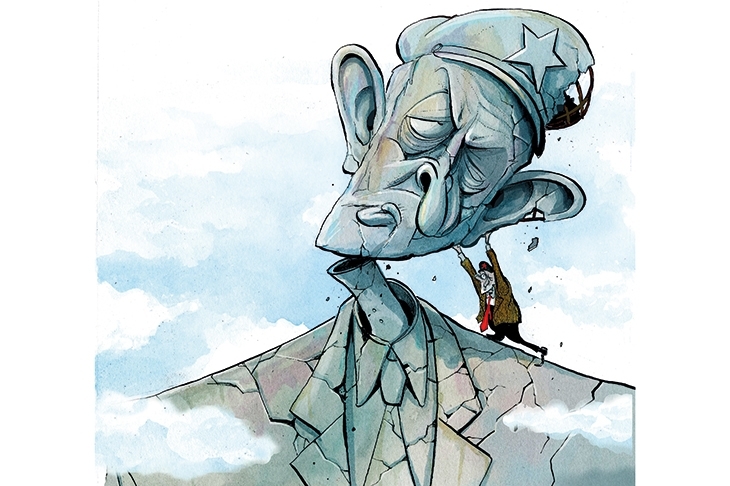Ever since Keir Starmer was elected leader in April a phoney peace has prevailed in the Labour party. While it looked inevitable to most outsiders, the ease with which Starmer beat Rebecca Long-Bailey – the continuity Corbynite candidate in all but name – took many on the left by surprise. Their disorientation only increased as Starmer swiftly removed key Corbyn loyalists from the Shadow Cabinet and Labour headquarters while establishing a majority on the party’s governing National Executive Committee. Most have consequently spent the last few months in a dazed shock.
Starmer’s surprise sacking of Long-Bailey from his front bench last week has seemingly kicked the left back into life. Senior Corbynite and former party chair Ian Lavery excitedly argued the Long-Bailey affair was all about Starmer’s desire to ‘purge’ the left and called on his faction to ‘Organise, Educate and Agitate’ in response.
But is there any way back for the Labour left? Or must they write-off the Jeremy Corbyn years as an unrepeatable, freakish accident, when somehow Labour managed to elect its most radical leader ever, who came close to winning office in 2017 by mobilising (as they would see it) hope against fear and in 2019 presented a manifesto which promised a truly socialist transformation of Britain – but which found little favour with voters.
While he was leader, many analysts were apt to compare Corbyn with Tony Benn and the radical shift in the party which occurred in the 1970s and 1980s. There were certainly many parallels. This earlier socialist moment also saw the left seize power in the party and similarly culminated in an unprecedentedly radical manifesto which Labour presented to the electorate only to have it decisively rejected. As in 2020, in 1983 the party responded to this terrible defeat by electing as leader someone who was neither hard-left nor-hard right and who welcomed some of the policy changes wrought by the Bennites while being concerned that voters disliked many others: for Keir Starmer read Neil Kinnock.
No historical moment is exactly the same but there are certainly two key lessons Corybn’s former supporters might draw from the period of opposition Benn and his allies endured after 1983.
The first lesson is: learn some humility about defeat. Benn described Labour’s 1983 manifesto as a ‘socialist bridgehead’ on which Labour should continue to build in a leftward direction. His supporters refused to accept any responsibility for the result – in votes the worst since 1935. Instead Bennites pointed to the jingoism of the 1982 Falklands War, the 1981 SDP split and incompetence in the party’s organisation. In fact Corbyn – who was elected as an MP in 1983 – still believes that is why Labour lost then.
But this implacable position meant Bennites refused to engage with Kinnock’s desire to make the party more ‘electable’ by at least finessing some of the policies contained in the 1983 manifesto. It is sometimes hard to recall how radical Kinnock – a fervent and longstanding unilateralist – was at this point. But he had opposed Benn’s decision to stand for the deputy leadership in 1981 because he feared – rightly as it turned out – it would split the party. This earnt Kinnock the bitter hatred of the Bennites; and their refusal to change a dot or comma in the 1983 manifesto ultimately gave him no alternative but to start making allies to his right.
The left today looks set to make the exact same mistake. For them the 2019 manifesto is the political equivalent of the Holy Grail, and to suggest it played any role in the party’s 2019 defeat – the worst since 1935 – is sacrilegious. Instead they blame Brexit, and say if Corbyn played badly on the doorstep it was because the media distorted his image and played up anti-Semitism. The manifesto therefore should not be changed one iota – indeed for the left the Covid crisis has made it more relevant than ever. As in 1983 there is some truth to this account. It would be foolish to deny that, most obviously, Brexit did not play a role in the election. But this mindset means that anyone who reflects on the mistakes that Corbyn made is thrown into the wilderness and castigated as a ‘Blairite’.
The second main lesson is: don’t collapse in on yourself. After 1983 Benn believed he saw the future of socialism in the Greenham Common women, striking miners and printers – anybody who was taking on the system in a direct and radical manner. He also embraced the Socialist Society, formed by left intellectuals who hoped to build a perfect extra-parliamentary movement that would challenge capitalism. Bennites failed, however, to even consider trying to win back middle-ground voters – many of them working class.
The early signs suggest this is the same path being taken by despairing Corbynites. If the elections held by Momentum – once hailed as Corbybn’s Praetorian Guard – are anything to go by the left has decided that it needs to spend the next period perfecting its own internal democracy and arguing over new ways of representing its members. These are arguably important issues but not ones which are likely to engage many Labour members or potential voters in an era defined by an inevitable post-Covid recession. Momentum itself is in steep decline: only 8,500 participated in the contest to decide its future direction.
Days before Keir Starmer sacked Rebecca Long-Bailey he was urged by the Times columnist Rachel Sylvester to ‘purge’ Labour of Corbynism. On the basis of how Corbynites are responding to his leadership, notably by not heeding the lessons of Bennism, it is unlikely he needs to take such extreme action: the left are in effect, purging themselves.






Comments